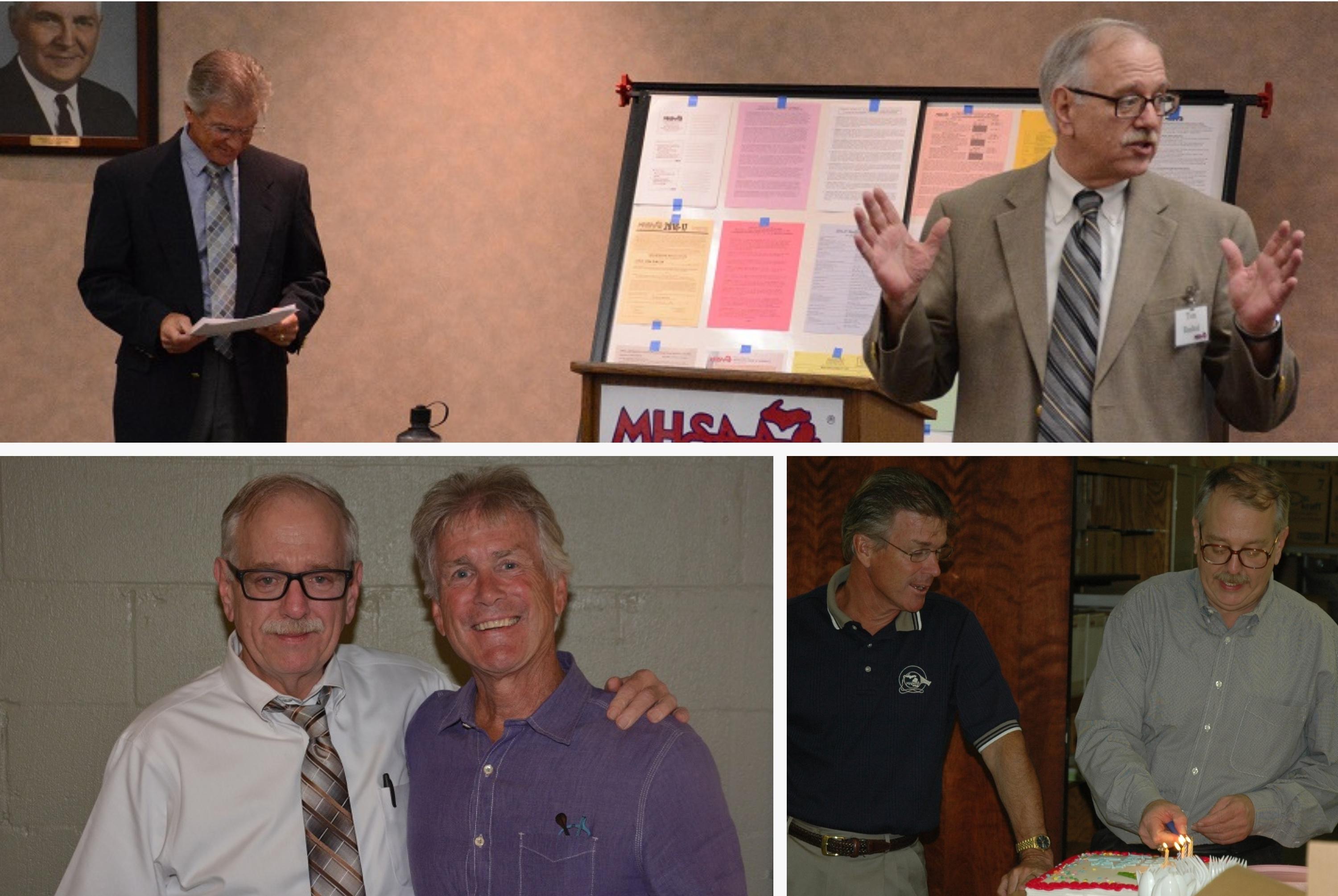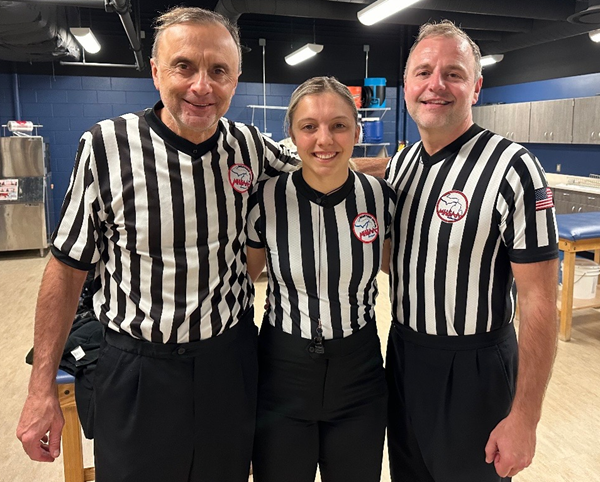
Jack Roberts, on Tom Rashid: One More Call
By
John E. (Jack) Roberts
MHSAA Executive Director, 1986-2018
December 9, 2021
More than a decade ago, with his knowledge, I placed in my “Will & Instructions Upon Death” that Tom Rashid was to be the one and only person to speak at my funeral or memorial service. A short number of years later, Tom told me that I was to do the same for him. Obviously, we knew that we could not both keep our promise to the other. But I must say, if Tom does not actually show up for my funeral, that will be the first time he has not kept a promise to me.
I understand there will be a time in the future, when the weather warms and COVID wanes, when school administrators across Michigan can gather in force to show their respects to Tom, and when I will provide the eulogy that Tom asked of me. But Tom’s recent death reminds us how uncertain life can be and suggests that I say some things now, before it’s too late.
Tom was the unparalleled master of award presentations; and for more than a dozen years he wrote and delivered polished praise on award recipients at the annual conference of the Michigan Interscholastic Athletic Administrators Association. My tribute now isn’t an awards presentation or hall-of-fame induction, so I won’t recount the particulars of Tom’s career; but what you will see here is the importance of Tom’s life … the themes that distinguish him from any other person I’ve known.
Tom comes from a large, complicated and compassionate family of parents, aunts, uncles, brothers, sisters, nephews and nieces who mourn his loss at levels few of us can fathom. Over the years, and for many years, he was the caretaker for several family members; and he was generous with all of them. My hope for each family member now – and for many days, weeks and months to come – is that you are at peace. Tom’s pain is over; and his place in eternity is secure. Tom purchased a reserved seat.
Tom often joked that his only good habit was prayer. That’s not really true, of course. But for as long as I’ve known Tom, he talked to God many times a day; and I’ve always had the feeling that he talked to God the same way he talked to us: bluntly, forcefully, passionately, honestly, loudly, making very plain what he had on his mind.
Tom was a rigorous practitioner of his devout Catholic faith; and, the God whom Tom believed in is a big God … the president, general manager and head coach of a huge, diverse team whose game plan is a large, loving Gospel of limitless parameters and possibilities. I have no doubt that, both in times of need and not, members of the Roberts family – including both my parents, my sister, my wife and our children and grandchildren – have been specific in his petitions to God. I have no doubt that Tom’s daily prayers included many of you, and your loved ones as well.
In addition to Tom’s immediate family is the even larger and even more complicated family Tom developed through a long, illustrious career in Michigan school sports administration: a full 25 years with the Archdiocese of Detroit, until 2003, when I invited him to join me at the MHSAA office in East Lansing.
During my 32 years as the executive director of the MHSAA, I never saw another like Tom … never, anywhere. He talked to anybody, anytime of the day or night, about any question or problem they might have. Usually, Tom didn’t need to give me notes reviewing his telephone conversations. From my adjacent office, and given his forceful voice, I could hear Tom’s every word, very clearly.
Tom had the ability to anticipate what I might need and take care of it without my asking. It is no exaggeration to say that Tom would do anything for me. For example, Tom’s reluctance to travel and his fear of flying are well known to many of you. I believe the one and only time that Tom flew in an airplane was in 2003, when I ordered him to fly to Texas so that he might receive the highest award of the National High School Coaches Association. He had never flown before; he has never flown since.
Most remarkable was not merely Tom’s unselfish, unlimited, legendary availability to athletic administrators at any hour of the day or night, nor his experienced, learned grasp of the subject matter in answering their calls. What was more remarkable was his effort to help school administrators through their hard times. On many occasions these callers had made an error of commission or omission. They had made a mistake or an oversight; and Tom was supremely compassionate in guiding them through the local fallout from disappointed athletes and disgruntled adults. Secure in himself and our mission to be servant-leaders, Tom very often shared or completely shouldered unjustified blame so others would not. He gave cover to countless local school administrators every year of his MHSAA career so that those administrators might survive and even thrive in their careers.
Among my remarkably loyal MHSAA staff, Tom still stands out. And he earned the enduring loyalty of those with whom he worked. I think especially of his successor at the Archdiocese of Detroit, Vic Michaels: I doubt that more than two days ever passed between their almost daily telephone conversations … usually in the morning … for the full 15 years that my office was next to Tom’s at the MHSAA. I have never, ever been witness to anything like that; and I know there is no one in our good work who misses our dear colleague more than Vic.
But most remarkable of all was Tom’s ability to turn an adversary into an ally. He could have a knock-down, drag-out argument with a person one day, and by the next day, and for years to come, that person was Tom’s greatest advocate and admirer.
Well … maybe second-greatest advocate and admirer. Because no one in athletic administration – no one – loved Tom more than I. And no one in our work told him this more than I did.
I have written often about my admiration and affection for Tom. I have spoken both publicly and privately of it, on many occasions. But let me say it one more time, here, as we celebrate his life, and mourn our loss …
Tom and I provide proof that opposites attract, and we tag-teamed MHSAA’s leadership. One of us was very outgoing and vocal, the other more reserved and reticent. One of us was loud, the other more subdued. One of us was more comfortable on the phone, the other with the pen. One of us had no idea what to do with apostrophes, while the other would put them in the correct places. One of us was more spontaneous and extemporaneous, the other a more detailed planner and measurer of consequences. One of us hated to travel, the other sent messages to him from distant oceans and continents every year on Christmas or New Year’s Day to thank him for his life and service. But in our hearts, where one’s core values are harbored, we were almost identical twins.
I doubt that any two people who were side-by-side in the workplace for 15 years expressed their gratitude for each other more than we did, nor any two co-workers who said “I love you” to one another as often as we did. We each felt in deep debt to the other for myriad gifts and gestures that improved our careers and our lives.
Over the years, Tom and I developed the strategy of making one more telephone call before we made a final decision in a difficult matter … making one more call that sometimes made a difference in the controversial decision we had to make or in how that decision was accepted by those it affected. Tom loved to be the one to make those calls. And, sometimes, that “one more call” made all the difference.
Throughout my adult life, whenever I’ve attended a funeral or memorial service, I’ve found myself asking what it is I should learn and try to emulate from the life of the deceased. If you should find your mind and heart doing anything like that now, may I suggest these two answers.
First, Tom’s life and death remind us that we should not delay a single day in telling those with whom we work that we appreciate them and are grateful for what they do. And, if it is true and you are able, say you love them. Tom did this more often than anyone I’ve known.
And the second message is this. Tom’s life stands for faithfulness … faithfulness to his God, faithfulness to his family, faithfulness to his colleagues and friends, and faithfulness to his work and the mission of not just amateur athletics, but particularly school-operated, educational athletics. His was a steadfast faithfulness, never-a-day-off faithfulness, you-come-first faithfulness.
So Tom, my dear friend, once again I say, “I love you.”
And, “Rest in peace, Tom. God knows, you rarely rested in life.”
I would give anything for just one more call.

Longtime Taylor AD, Game Official Ristovski Chose Athletics as Way to Give Back
By
Doug Donnelly
Special for MHSAA.com
February 20, 2024
There is a basketball court 5,000 miles from Sterling Heights with “MHL” painted on the center court.
 It’s not the name of a local basketball league in the village where it is located – Siricino, Macedonia. Instead, it stands for Madison, Haleigh and Lola, the three daughters of longtime Michigan basketball coach, referee and athletic director Loren Ristovski.
It’s not the name of a local basketball league in the village where it is located – Siricino, Macedonia. Instead, it stands for Madison, Haleigh and Lola, the three daughters of longtime Michigan basketball coach, referee and athletic director Loren Ristovski.
“My dad loved going back (to Macedonia),” said Madison Ristovski. “He’s probably gone every summer since about 2017. His whole family still lives there. He loved going and visiting and seeing everyone.
“It was always a goal of his to give back to where he came from. He and Mom donated to the village to build a soccer field and basketball court with lights and everything. It was a pretty big deal. It’s something he wanted to do for them back home. We were very proud he did that.”
Loren Ristovski, athletic director for Taylor schools, died earlier this month while on leave to have surgery on his foot. It was a shock to his family, friends, and the Taylor community.
“It was a heavy blow,” said Matt Joseph, girls basketball coach at Utica Ford and a longtime friend of the Ristovski family. “It was like getting kicked in the gut. Basketball was his passion. Next to his family, basketball was definitely No. 1. He loved the game and all the intricacies of it. He loved seeing kids excel.”
 Ristovski emigrated from Macedonia to Michigan when he was 9. He went to high school at Hamtramck St. Florian, where he excelled at basketball. He went to Wayne State University to get a degree in criminal justice and had plans to become a lawyer.
Ristovski emigrated from Macedonia to Michigan when he was 9. He went to high school at Hamtramck St. Florian, where he excelled at basketball. He went to Wayne State University to get a degree in criminal justice and had plans to become a lawyer.
Before he could take the Law School Admission Test, however, basketball came calling.
“He started coaching at Henry Ford High School and Fuhrmann Middle School,” Madison said. “Once he realized how much he enjoyed coaching, he decided to go into education. He stayed the entire time. He never went to law school.”
Loren Ristovski became the head coach at Harper Woods but gave that up when his daughters were ready to start playing in high school.
“He gave up coaching varsity at Harper Woods so he could be at every one of my games,” Madison said.
He also coached them as youngsters, often teaming with Joseph to coach an AAU team.
“I met him when Madison was 5,” Joseph said. “He and I decided to put our daughters in the same parks and recreation team, and next thing you know we were coaching AAU.”
With Ristovski’s tutoring, Madison, Haleigh, and Lola all excelled at the game, each playing Division I college basketball after standout careers at Grosse Pointe Woods University Liggett. In 2012, Liggett reached the Class C Final with all three starting. They combined for 55 of Liggett’s 57 points in the championship game, with Madison scoring 42 after earlier that week receiving the Miss Basketball Award.
Lola and Haleigh played at the University of Detroit Mercy, and Madison played at the University of Michigan. Today, Haleigh lives on the west side of the state and plays recreational basketball. Lola is a referee in the Catholic High School League as well as for the Division II Great Lakes Intercollegiate Athletic Conference, and also works area Division III college games.
Madison is a teacher and the varsity girls basketball coach at Sterling Heights Stevenson.
“He taught us the game when we were very, very young,” Madison said. “We grew up in the gym with him and watched him coach his team. He coached me my whole life. He was very instrumental – he taught us all those things you need to become an athlete, and more importantly the things you need to do to succeed in life.”
Her dad is the reason she became a coach.
 “Watching my dad coach and seeing the impact he had on his high school athletes and even the kids in our church community – it inspired me to want to coach as well and give back like he did,” she said. “I watched him with my teammates and the impact he had on them. I thought it would be so cool if I could do the same for others.”
“Watching my dad coach and seeing the impact he had on his high school athletes and even the kids in our church community – it inspired me to want to coach as well and give back like he did,” she said. “I watched him with my teammates and the impact he had on them. I thought it would be so cool if I could do the same for others.”
Loren Ristovski left a legacy at Taylor, too. School officials recounted several stories of how he balanced athletic budgets with the needs of student-athletes. He would lead fundraising efforts, created the Bitty Ball program for youth basketball players and cheerleaders and helped students become certified officials – and then would hire them to officiate games.
“He didn’t say no,” said Taylor boys basketball coach Chris Simons. “We made it work. We didn’t go out and ask people for a bunch of money. We would just do it. We all pulled together and made it work. Loren did everything he could to make things as pretty and presentable as he could with the budget we had.”
Ristovski also put on summer camps at both Taylor and at the Joe Dumars Fieldhouse in Sterling Heights, where he lived. He commuted about an hour to Taylor every day.
“He loved Taylor,” Madison said. “He loved who he worked with and the students. He included us, too. My mom would run the ticket table or do the scoreboard clock. I don’t know how many times I sold tickets for volleyball tournaments with him. He loved his people and loved having us there with him.”
Loren Ristovski, who played professional basketball in Europe during the late 1980s, ran well over 20 marathons in his life, including the Boston Marathon. He was a registered MHSAA official for 16 years, and in the weeks before his passing he refereed a varsity game in Rochester with his daughter, Lola.
“He looked at basketball, I think, differently than other people do,” Madison said. “He saw it as a way to have relationships with other people, to help people achieve their goals and to find meaningful relationships with others. It was more than just a game to him.”
 Doug Donnelly has served as a sports and news reporter and city editor over 25 years, writing for the Daily Chief-Union in Upper Sandusky, Ohio from 1992-1995, the Monroe Evening News from 1995-2012 and the Adrian Daily Telegram since 2013. He's also written a book on high school basketball in Monroe County and compiles record books for various schools in southeast Michigan. E-mail him at [email protected] with story ideas for Jackson, Washtenaw, Hillsdale, Lenawee and Monroe counties.
Doug Donnelly has served as a sports and news reporter and city editor over 25 years, writing for the Daily Chief-Union in Upper Sandusky, Ohio from 1992-1995, the Monroe Evening News from 1995-2012 and the Adrian Daily Telegram since 2013. He's also written a book on high school basketball in Monroe County and compiles record books for various schools in southeast Michigan. E-mail him at [email protected] with story ideas for Jackson, Washtenaw, Hillsdale, Lenawee and Monroe counties.
PHOTOS (Top) Loren Ristovski, far left, and wife Svetlana support their lineup of Division I basketball-playing daughters – from left: Madison, Haleigh and Lola. (Middle) Loren Ristovski heads an all-family officiating crew with Lola and his brother Dean Ristovski. (Below) The daughters’ initials “MHL” glow on the court the family funded in Macedonia. (Photos courtesy of Madison Ristovski.)

